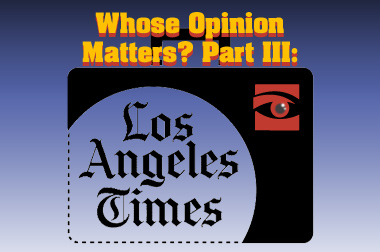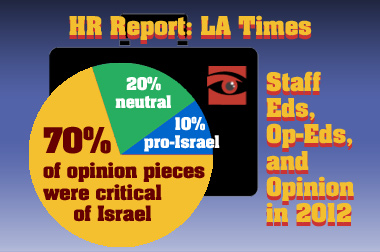Whose Opinion Matters? Part 3: The Los Angeles Times
July 24, 2013 10:21
by Yarden Frankl

We now turn to the Los Angeles Times. The last time we reported on the LA Times, we concluded the following concerning its overall coverage of Israel:
By painting a picture of the conflict in which Israel is depicted negatively and the Palestinians are ignored, the LA Times inevitably shapes public perception of Israel and the conflict.
This series is specifically interested in opinion pieces. These are staff-eds and op-eds that, by definition, are written with a bias. These are, by nature, subjective and while — unlike hard news coverage — we do not expect objectivity in every piece, we do expect a balance between those expressing a position supportive of Israel and those which are critical. So, were a diverse range of opinions on Israeli represented in the LA Times opinion pages in 2012?
We found that this was not the case.
In fact, out of the 30 opinion pieces that we analyzed, 21 of them (70%) expressed a negative opinion on Israeli policies. Three of them were supportive of Israel (10%) while six (20%) could be defined as either neutral or balanced (critical of both sides equally.)

Staff Eds
The LA Times itself explains what staff-eds are:
What exactly is an editorial? The simple answer is: an unsigned article expressing the newspaper’s opinion on a matter of public interest. It’s the one place in the newspaper where The Times tells you what it thinks as an institution.
So what does the LA Times think of Israel? Of the editorials in our study, six were critical of Israeli actions while only two could be considered neutral. The negative staff-eds argued primarily that delays in the peace process were, in the main, Israel’s sole responsibility.
In Mitt Romney: Pandering on a World Stage, the editorial says (emphasis added):
Romney’s eagerness to pander to those voters he perceives to be pro-Israel overwhelmed his common sense……Romney’s comments infuriated Palestinians because they neglected to note the devastating effects of Israeli trade restrictions on the West Bank and of the near-total blockade imposed on Gaza after Hamas took power.
Why is it pandering if blame for the impasse in the peace process is attributed to the Palestinian refusal to enter peace negotiations? Since the editorial raised the subject of the trade restrictions and blockade, shouldn’t those have been put into their proper context? Otherwise, the editorial is pushing a critical opinion of Romney, but of Israeli polices as well.
In Is The Two State Solution Dead?, we are told that (emphasis added):
These are dark days for the peace process. Talks are paralyzed. Several Palestinian hunger strikers are in declining health after more than two months without food. Israel retroactively legalized three controversial settlement outposts on the West Bank.
Nothing is mentioned of Palestinian incitement, corruption and rocket attacks against Israel as reasons that the two state solution might be dead. The examples given all reflect badly and one-sidedly on Israel. Talks are “paralyzed” because the Palestinian Authority refuses to talk, not because of any hunger strikers.
In Middle East peace takes a beating, the editors cynically ask:
Well, excuse us, but what negotiations and peace process are they referring to? For all intents and purposes, the process has been dead for several years. Palestinians refuse to participate in talks because of continued settlement expansion. Israelis won’t commit to a moratorium on settlement building…..
But as it responds (to continued rocket attacks), Israel would be wise to remember the brutal war it fought in Gaza four years ago that killed 1,200 Palestinians without successfully dislodging Hamas or permanently stopping the militants and their rockets. Israel was condemned around the world for that disproportionate assault and gained little. Going back down that familiar path would be catastrophic.
As we have seen in many places, the 1,200 “Palestinians” figure is cited without noting that this is according to Hamas sources and lumps terrorists together with civilians. Even more significant, although the Israeli operation did not completely silence the rockets, the Israeli response drove the Hamas leadership underground and limited the once continuous attacks. Again the editors have chosen to write in a style that shows Israel in the least favorable light.
Columns and Op-Eds
In explaining which op-eds it selects to publish, the LA Times says:
Our mandate, as we see it, is straightforward: to provide provocative, thoughtful commentary that is reasoned yet opinionated on a wide variety of subjects. The page itself has no ideological bent or political agenda; we want to provide the broadest possible range of opinions — from the left, from the right and, we hope, from authors whose politics are much harder to pigeonhole.
Sometimes we get e-mails complaining that the pieces we’ve run are biased. To which we reply: Of course they are! Unlike the articles in our news pages (where reporters endeavor to be objective), our articles are opinion pieces; bias and a point of view are expected.
With the weight of the newspaper editorial team clearly coming down against Israel, one would expect different opinions from the op-eds that the LA Times chooses to publish. This was, however, not the case. The majority of outside contributors selected for publication shared the LA Times’ bias against Israel. Out of twenty-two op-eds in our study, fifteen (68%) were written with an anti-Israel bias.
Obama’s real Israel problem — and it isn’t Bibi by Phyllis Bennis is a diatribe against Israel. A whole litany list of Israeli abuses is listed (with no criticism of the Palestinian Authority) — summed up by:
The problem isn’t Israeli Prime Minister Benjamin Netanyahu or his Likud Party, or even Israel’s current extreme right-wing government. Israel’s fundamental policy toward the Palestinians is the problem, and that policy has hardly changed, despite the seemingly diverse sequence of left, right and center parties that have been in power.
Israel’s Failed Strategy by Daoud Kuttab raises the irrational notion that Israeli defensive measures to protect its citizens must be limited because only “several” civilians have been killed by rocket attacks:
It’s true that Gazan missile attacks have killed several Israeli civilians. But Israel’s recent military actions have been shockingly disproportionate, aimed at densely populated areas in which besieged Gazan civilians have no place to escape the overwhelming and exaggerated Israeli firepower.
He neglects to mention that the Israeli Army goes to extraordinary steps to try and avoid civilian casualties, despite the difficulties posed by the Palestinian strategy of firing from densely populated civilian areas.
In Renew the Mideast peace process? Not now, Chuck Freilich writes that:
Israelis cynically refer to the repeated rounds of violence with the Arabs as “happiness,” as in “it’s happy today.” Before the cease-fire, as Hamas fired 1,000 rockets at Israel, it was indeed very “happy.”
It is nonsensical to suggest that anyone in Israel was “happy” about having thousands of rockets fired at civilians on an almost daily basis. Yet in making the point, Frielich creates a misleading image of Israel as trigger happy and preferring war to peace.
Conclusion
Is the LA Times even aware that both editorials and op-eds are heavily weighted against Israel? The issue of balance is addressed in “Op-Ed, Explained” which is a linked to the opinion page. Here is what it says (emphasis added):
People often want to know whether we seek balance on the page. The answer, as best I can give it, is this: We want a page that is politically balanced over time — not leaning too heavily to the left or the right — but we don’t monitor it day to day, or count Democrats versus Republicans. Similarly, we seek diversity of thought and diversity of contributors — we want provocative ideas from people of all races, genders, religions, etc. — but again, we don’t try to balance the number of women to men on every single page.
So while the LA Times claims that it hopes for balance over time, this is not something it watches day to day. But when a year’s worth of opinion pieces all lean the same way, something is wrong.
Our conclusion from surveying a year’s worth of opinion pieces from the Los Angeles Times shows that the same anti-Israel bias that infects its hard news coverage is also reflected on its editorial pages.
You can contact the LA Times by clicking here.
This is the third segment in our series analyzing the opinion pages of major media. Read the previous studies:
Whose Opinion Matters — A Look at the New York Times
Whose Opinion Matters? Part 2: The Washington Post
Source material can be found at this site.









